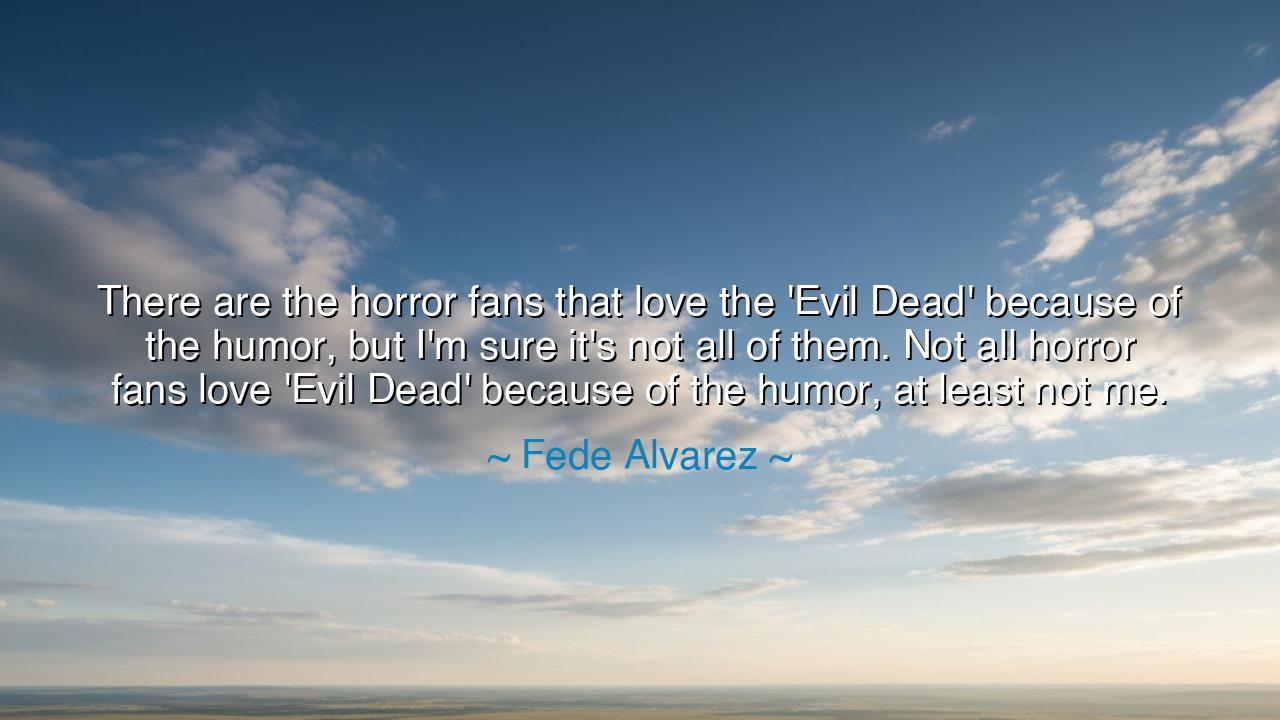
There are the horror fans that love the 'Evil Dead' because of
There are the horror fans that love the 'Evil Dead' because of the humor, but I'm sure it's not all of them. Not all horror fans love 'Evil Dead' because of the humor, at least not me.






In the dark corners of human experience, where fear and desire meet, there exists a world that holds both terror and exhilaration—a world where the boundaries between horror and humor are not always clear. It is here, in the domain of film and storytelling, that the great works of the genre come alive. And one such work, "Evil Dead", stands as a testament to the complex, often paradoxical nature of fear and laughter. When Fede Alvarez speaks of the film’s humor, he speaks not only of the audience's perception but of the deeper tension that exists between the elements of horror and comedy. His words, "There are the horror fans that love the 'Evil Dead' because of the humor, but I'm sure it's not all of them. Not all horror fans love 'Evil Dead' because of the humor, at least not me," reflect the struggle between the two forces—terror and laughter—that are woven into the very fabric of the film.
In ancient times, stories of the supernatural were often laced with both terror and wit, for the storytellers knew that the human spirit could only endure so much fear. The tales of the gods and monsters were not just warnings but lessons, meant to teach us about our vulnerabilities and the nature of the unknown. Yet, these tales also contained elements of humor, perhaps as a shield to protect the listener from the overwhelming fear that such stories could invoke. The great Greek playwrights, like Euripides and Aristophanes, understood this balance. In their tragedies and comedies, they explored the human condition in all its complexity, blending sorrow with laughter, fear with joy, knowing that the soul could not survive without both.
"Evil Dead", in its own way, captures this ancient understanding of the power of duality. It is a film that combines the grotesque with the absurd, a tale of demonic possession and blood-soaked mayhem interwoven with moments of dark, almost slapstick, humor. To some, this humor serves as a means of survival, a way to laugh in the face of the horror that unfolds. Yet, as Alvarez points out, this humor is not universally embraced. Some horror fans may find themselves drawn solely to the raw terror of the film, seeking to be scared without the distraction of laughter. For them, the humor may feel like an intrusion upon the purity of their fear, a betrayal of the atmosphere they long to immerse themselves in.
This tension between horror and humor is not unique to "Evil Dead", nor is it a modern phenomenon. Consider the story of the Machiavellian ruler, who, in the midst of cruelty and tyranny, would often crack a joke to defuse the tension of the court. The humor would disarm, allow for a momentary respite, and make the horrors of the reign feel more bearable, even palatable. It was a device, a way to maintain control over the emotions of the people, to keep them teetering on the edge of terror without allowing them to fall into despair. Similarly, "Evil Dead" plays with this very balance, offering moments of reprieve in between the bloodshed, allowing the audience to laugh even as they are terrified, thus reminding them of the complexity of human emotion.
The true essence of Alvarez’s statement lies in his recognition that the human experience is neither wholly dark nor wholly light. We are creatures of contradiction, capable of finding humor in even the darkest corners of our minds. In ancient myths, the gods often laughed as they destroyed, a reminder that laughter and sorrow are not opposites but partners in the grand dance of existence. The famous Norse god, Loki, the trickster, is a perfect example of this duality. He was both a bringer of chaos and a source of laughter—his actions causing pain and pleasure in equal measure. In him, the ancient storytellers embodied the deep truth that life, like horror and humor, is a mixture of the tragic and the comedic, each feeding into the other, each making the other more potent.
Thus, the lesson from Alvarez’s words is not just about the film, but about the very nature of the stories we tell ourselves and the lives we lead. Life itself is filled with both terror and joy, and to embrace one without the other is to miss the fullness of the human experience. There will be times when we are drawn to the depths of darkness, seeking to face our fears head-on. And there will be times when laughter becomes our sanctuary, allowing us to endure, to find light even in the gloom. To be truly alive is to navigate this delicate balance, to understand that humor is not a substitute for horror, but a means of survival within it.
Let us, then, take from this wisdom the understanding that, in our own lives, we must find the humor in the horrors we face. Whether it is the small frustrations of daily life or the great trials that shape our destiny, we must learn to laugh in the face of difficulty. Not all of us will find comfort in the laughter of others, nor will all of us seek to find humor in every dark moment. But by acknowledging the power of humor and its ability to deflect the intensity of life’s trials, we can better navigate the complex landscape of our emotions. And perhaps, in doing so, we will find that even in the darkest times, there is always a spark of light, a glimmer of laughter waiting to be embraced.






AAdministratorAdministrator
Welcome, honored guests. Please leave a comment, we will respond soon